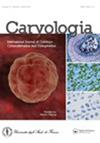Analysis of CMA-DAPI bands and preparation of fluorescent karyotypes in thirty Indian cultivars of Lens culinaris
IF 2.1
4区 生物学
Q2 Agricultural and Biological Sciences
引用次数: 2
Abstract
India holds a significant rank in production and consumption of the age old protein rich crop Lentil with only one cultivated species and a large number of phenotypically similar cultivars. The need for a reliable and cost effective method of genetic characterization to unravel differences within the Lentil cultivars was felt. The present paper adopted EMA based chromosome preparation followed by staining with two contrasting fluorochromes dyes CMA and DAPI that bind directly to GC and AT rich heterochromatic segments on chromosomes. Analysis of fluorochrome banding pattern furnished a comparative account of genetic diversity within the cultivars that could not be achieved by traditional karyotyping. The marker pair of nucleolar chromosomes (4th and 3rd, majorly) occupied a pivotal position to intensify differences between cultivars in terms of banding patterns around secondary constrictions, suggestive of yet unknown variation in heterochromatin composition. Our study has strengthened genetic background and relationships of Lentil cultivars. We observed certain types of unusual fluorochrome bands that put forward the exclusivity of Indian germplasm and have questioned the mainstream heterochromatin elements of plant chromosomes captured by CMA-DAPI stains. The comprehensive fluorescent karyotypes of 30 L. culinaris cultivars prepared for the first time, serve as an archetype for the benefit of future breeding programmes in any Indian crop.30个印度稻属品种CMA-DAPI谱带分析及荧光核型制备
印度在生产和消费具有悠久历史的富含蛋白质的作物扁豆方面拥有重要的地位,只有一种栽培品种和大量表型相似的品种。因此,需要一种可靠且经济有效的遗传鉴定方法来揭示扁豆品种之间的差异。本文采用基于EMA的染色体制备,然后用CMA和DAPI两种对比荧光染料染色,这两种染料直接结合到染色体上富含GC和AT的异色片段上。荧光带型分析提供了传统核型无法获得的品种间遗传多样性的比较说明。核仁染色体的标记对(主要是第4和第3)在强化不同品种间围绕次生缢痕的带型差异方面起着关键作用,暗示了异染色质组成的未知差异。本研究加强了扁豆品种的遗传背景和亲缘关系。我们观察到某些类型的异常荧光条带,提出了印度种质的专有性,并对CMA-DAPI染色捕获的植物染色体的主流异染色质元件提出了质疑。首次制备的30个L. culinaris品种的综合荧光核型,可作为未来任何印度作物育种计划的原型。
本文章由计算机程序翻译,如有差异,请以英文原文为准。
求助全文
约1分钟内获得全文
求助全文
来源期刊

Caryologia
生物-遗传学
CiteScore
1.60
自引率
23.80%
发文量
26
审稿时长
12 months
期刊介绍:
Caryologia is devoted to the publication of original papers, and occasionally of reviews, about plant, animal and human karyological, cytological, cytogenetic, embryological and ultrastructural studies. Articles about the structure, the organization and the biological events relating to DNA and chromatin organization in eukaryotic cells are considered. Caryologia has a strong tradition in plant and animal cytosystematics and in cytotoxicology. Bioinformatics articles may be considered, but only if they have an emphasis on the relationship between the nucleus and cytoplasm and/or the structural organization of the eukaryotic cell.
 求助内容:
求助内容: 应助结果提醒方式:
应助结果提醒方式:


